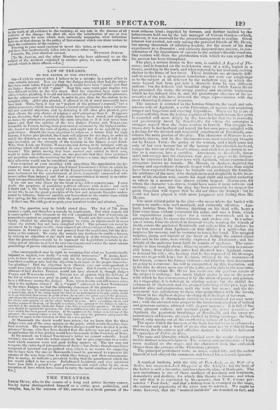[Our correspondent may be right in assuming that whist we
hypothetically imputed as neglect, was really .. a very skilful manumtvre." It seems, however, to have been an unftirtunate one for the prisoners. What would have been their condition now had the objection been made st the proper time—before pleading? Ilad tbe s,bjection been allowed, says our correspondent. it would have (mused the adjournment of the Court. Mit it would net have been allowed—Chief Justice TINDAL W0111(1 110I have allowed it, though dtislecs l'attui: and 1V11.1,1Ams would. TINDAL was of opinion that the delivery of the list of witnesses was maul in point of law. There would theretbre have been a dilferemaamong tile Judges. Now, when doubts and differences arise, what is the uniform course ? In a "report " addressed to Lord Non5IANLY by the three Judges, we tind the lidlowitig statement of the practice
" As 10 tins law, the intiforin practice has C(!ea, So cal' IMO: 1,,• WO !Lisa:My 111,111A Ur 1:110Wh'INt!, that if the Judge upon the trial or tin itolielotent l',..ols any ,orion: deaht as Is all OhilaSi.al that occurs in point or kw, lie dvo.ideI ht. 10,ha al:tillsi llso prisonor, and allons Ow Iasi to proceed, rest.rs log such point ,ti. tm. m ■mter sluts Ile 11,1y false the :els iee awl tipiiiinis or ail Val' other ,Ittolges tIn•reon. After coasulting tlwin, and lwaritiL■ arnttinent thereon, (it unsieht Iss,ssarv.) the opinion of lit, itiii:les is titiii•ii ; coil skit et the majority hinds the .111c1;:e who luts re,rled the tpiestion. Is that opinion shosthl be against the prnitater, the law is solVered to take it, 'lire,'. :not the setttenet. which has issai passed reaiaill, It the opinion of tho .111414es is in favour or the prisoner, the vonstant eourse is the the.1tol,,e who tried the prisoner :old passed the sentenr.e to apply to the :secretary of State rov a free Nylon."
At Monmouth the doubt would have arisen ; for we know that the three Judges were not of the reline opinion on the point, which would thereftwe Intve been rescreed. Tlw majority of the fifteen Judges would have decided it in the prisoners' favour, (thr thev have decide(' that the delivery WaS 110t !`011(1.) alla an application for a free pardon would have been made to the Secretary of State.
In the IPIIIIIrk On ColOilel TII03IPSON'S letter we cannot coincide. 1.(aml accuracy was not what the writer aimed at, but to give expression to a sentiment witich CO111111011 SelISC and good feeling approve of. The law mar not recognize the extra.legal iliterpositions of .1 lilies ; butt JIll'iCR, III0lIgll SOIIICiiIIIPS COIIIIIOSCd I)r ignorant euil prejudiced men, (there is no reaS(711 for supposing thus to hisve been the (Ilse at Aloninouth.) ninst he presumed to represent the Opilli011 Of tile very large chaos to which they lielomr; and their recommend:I.tiOlt to mercy, to indicate is prevalent ft-cling that the punishment shish the
know I • little is gained to good government ;nal social order Itv the stern execution of laws which have ceased to carry the moral sanction of' society.— Fn.]


























 Previous page
Previous page